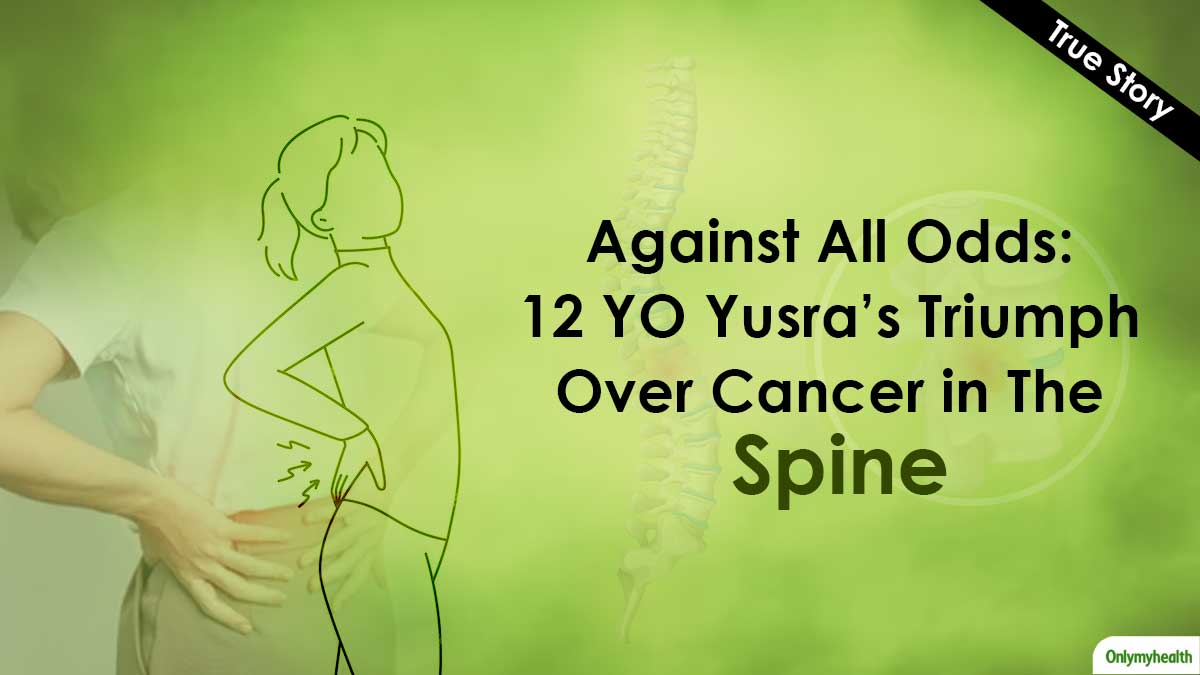
With a smile that lights up the room, twelve-year-old Yusra observes the usual hustle and bustle of the Rajiv Gandhi Cancer Institute and Research Centre, while having a chemotherapy needle in her arm. It wasn’t long since she was diagnosed with Spinal Chordoma and she started becoming familiar with the corridors of the institute. I remember looking at her frail body, the cannula on her arm, and her eyes filled with hope for a better tomorrow, while she was talking about what she was planning to paint the next day.
Table of Content:-
According to Dr Akshay Tiwari, Senior Director of Musculoskeletal Oncology, Max Hospital, Chordoma is a rare, slow-growing cancer of the bone that affects the two ends of the spine, the upper end close to the head and, more commonly, the lower end of the sacrum. The most common symptoms of chordoma are pain and involvement of nerves causing paralysis/ loss of bladder bowel control. The best chance at recovery is with complete surgical removal of the tumor, which requires a team of orthopedic oncologists, neurosurgeons, and plastic surgeons.

Pre-Diagnosis
Every afternoon at 2.30, Yusra would get back home from school, skipping one step of the staircase at a time and humming all the hit tunes of the time. She would run directly to the kitchen and narrate everything that happened throughout the day at school to her mother. After lunch, she would lie down in her grandmother’s lap and repeat all those stories, giggling and laughing as she mixes up the details at times. After completing her homework, one could always find her fingers half-dipped in paint bottles and multiple strokes of colours on her clothes. As her mother would run behind her scolding her for ruining the clothes, she would hide behind her grandfather, hoping not to get caught.
But that day in the month of May was different. At 2.30 in the afternoon, there was no humming to be heard. There was no sound of giggles and laughter when she came home. Her hand was on her lower back and the teardrops resting on her cheeks told an entirely different story.
Also Read: Unbelievable True Story Of A Man Who Survived Four Different Cancers In Five Years
Diagnosis
As the condition progressed, the back pain kept increasing and Yusra lost her ability to balance and walk on her own. The local doctors never considered the possibility of a tumor and kept treating her for some or the other nerve conditions. It took another four months of extreme pain and discomfort for the final diagnosis to be made at the Meerut Cancer Hospital.
After the diagnosis was made, it felt as if the world came crashing down. The family struggled to wrap their heads around the reality and think about what the future holds for their little one.

Treatment and Challenges
The treatment plan included a combination of extensive chemotherapy, radiation therapy, and medication, which was spread over a period of six months. Though the chemotherapy was doing its job, it came with its own set of side effects, consistent hair loss and extreme loss of weight being a few of them.
Journey to Recovery
Despite all the challenges fate threw her way, Yusra stood strong and took it all like a warrior. Her smile never faded away and the artist in her never lost hope. A new painting of hers would be the talk of the family Whatsapp group every couple of days, and her snap streaks never ended, if you know what I mean. She would still remember all the new radio hits and was an active participant in her sister’s wedding festivities, despite her continuous therapy appointments.
Her support system, including her family and the medical staff of Rajiv Gandhi Cancer Institute and Research Centre, played a huge role in keeping her spirits up throughout the treatment process. In spite of the gravity of the illness and the risks associated with it, they never stopped giving her hope and support in every way they could.
Life after Chordoma
After an extensive treatment process that almost took the life out of her, Yusra finally came out the other side. She beat cancer after a long battle and emerged victorious, however, there was still a long way to go. She needed to learn how to walk… again. Yusra is still taking regular physiotherapy sessions to regain her mobility. It will take its own time to show results, but at least the more difficult phase has passed.
Twelve-year-old Yusra is an inspiration for the rest of us and made me realize that strength and resilience have nothing to do with one’s age, but their will to survive.
Also watch this video
How we keep this article up to date:
We work with experts and keep a close eye on the latest in health and wellness. Whenever there is a new research or helpful information, we update our articles with accurate and useful advice.
Current Version